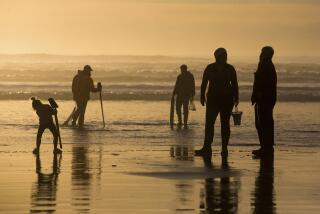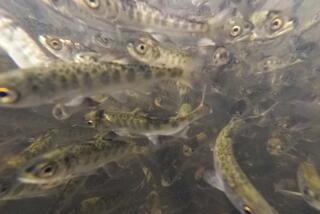Mercury Peril Warnings Catch Fish Eaters Short : New England: But some say they will ignore Maine’s new health advisory, which covers lakes and rivers.
- Share via
BELGRADE, Me. — Dark-bottomed clouds float in to cover the early morning sun as late breakfasters linger in the dining room of Castle Island Camps. A fisherman carries a rod and gas tank to the boat landing, preparing to shove off into Long Pond.
The pond, stretching on both sides of the camps, epitomizes the tree-lined serenity of the surrounding Belgrade Lakes region. But there is an uneasiness these days in the wake of a statewide public health advisory warning of mercury contamination.
Women of childbearing age and children under age 8 are being urged not to eat any fish from any pond or lake in Maine. Others are advised to restrict their consumption to no more than six large fish or 22 small ones annually.
Mercury ingestion at high levels can harm the development of children and human fetuses and cause nervous system disorders and kidney damage, scientists say.
At Castle Island, there is no sense of alarm. But, as at other popular fishing locations around the state, which boasts nearly 5,800 lakes and ponds, there is talk about the sweeping nature of the health advisory and the extent of harmful pollution.
“Most of the people from out of state haven’t even heard of it,” said Bryan Castle, the camps’ assistant manager. “As far as the locals who come by, they say they’re going to eat as much fish as they always have.”
Down the road on Belgrade Bridge, Steve Jones began a conversation by dismissing the significance of the warning.
“I don’t let it worry me, to tell you the truth,” Jones said. “I’ll keep eating them.”
But soon he conceded that the recent warning was changing the way he thinks about fishing, given the potential effects on his pregnant wife and 5-year-old son.
“The boy, I’ll probably let him have some. I probably won’t let him eat it like he did last year,” said Jones, 23.
He added that he would discourage his wife from eating fish, “but she doesn’t care too much for fish anyway.”
Jones said other warnings in recent years--dioxin-related cautions on fish consumption have been issued for several Maine rivers--and his own concerns about pollution shaped his current approach to fishing.
“I’ll eat the humpback perch because they’re easy to fillet out. Salmon, stuff like that. . . . I never eat the river fish,” he said.
Maine’s advisory, which officials say they hope to refine as more data from a federally aided survey of more than 120 ponds are analyzed, was welcomed by environmental advocates at Clean Water Fund and Clean Water Action in Boston. Last year they issued a report on the buildup of toxins around New England.
At that time, the Clean Water coalition called for a regionwide health advisory covering all freshwater fish.
Around northern New England, official advice varies greatly.
Until recently, New Hampshire had issued no advisory, but had recommended that people who consume a lot of fish--more than 3/4 pound of freshwater fish a week--vary the source of their fish.
Brook Dupee of the New Hampshire Division of Public Health Services said the aim was to guard against repeated exposure to unhealthful levels of mercury, “if there is a hot spot out there.”
On June 10, an advisory went out for one body of water, warning against consumption of any largemouth bass from Horseshoe Pond in Merrimack.
Dupee said New Hampshire officials are reviewing new data from the Environmental Protection Agency and analyzing more fish samples, so that “it would not surprise me if New Hampshire were to consider revising its recommendations” to strengthen them.
In Vermont, an advisory cautions against eating walleye from Lake Champlain. Women of childbearing age and children are advised to abstain; others are urged to eat no more than one meal per month.
Testing continues, said district fisheries biologist Brian Chipman, although he added: “We haven’t looked at a lot of our smaller bodies of water for mercury in recent years.”
The Vermont advisory was issued after fish samples taken from Lake Champlain were found to contain levels of mercury that averaged slightly more than one part per million, the threshold for action set by the Food and Drug Administration.
The FDA “action limit” is substantially higher than the 0.43 parts per million used by Maine as an indicator of concern.
Maine’s threshold more or less matches the national average, according to Martha Keating, a staff scientist with the EPA’s Office of Air Quality Planning and Standards.
Keating said Maine’s advisory is one of the nation’s most sweeping; Michigan is the only other state to issue a statewide warning.
Analysts suggest that at least some of the contamination in remote ponds and lakes in states such as Maine may originate far away.
“I think that’s probably a good hypothesis at this point,” said Keating, who is based at an EPA headquarters in Research Triangle Park, N.C. “We’re getting long-range transport of mercury from other areas. . . . It’s beyond the hypothesis stage.”
For many who fish for sport, mercury levels may not matter much.
“I don’t think it’s probably a big concern for fishermen because basically they catch and release,” said Nick Hill, behind the counter at D. L. Fleury’s Sporting Goods Inc. in Winthrop.
Nationally and even worldwide, “it’s becoming more and more evident that the problem is widespread,” said William Fitzgerald, a professor of marine sciences at the University of Connecticut.
Fitzgerald estimates that mercury deposits, on average, are three times greater than they were a century ago, but that it remains to be seen whether there has been a similar elevation in levels in fish.
“Coal combustion ranks high,” said Fitzgerald. “Smelting is a contributor. Waste incineration, without a doubt. . . . There’s even estimates for cremation.”
“We breathe worse than what we eat,” said Robert Fitch, 49, who frequently fishes with his 8-year-old granddaughter. “I mean, everything we eat these days is going to kill us.”
Eyeing the Sticky River off Sebago Lake near his home, Fitch said he usually releases his catches anyway, but has paid attention to the advisory.
“As far as that goes, I listen,” he said. “But I enjoy fish. I eat fish.”
More to Read
Sign up for Essential California
The most important California stories and recommendations in your inbox every morning.
You may occasionally receive promotional content from the Los Angeles Times.










